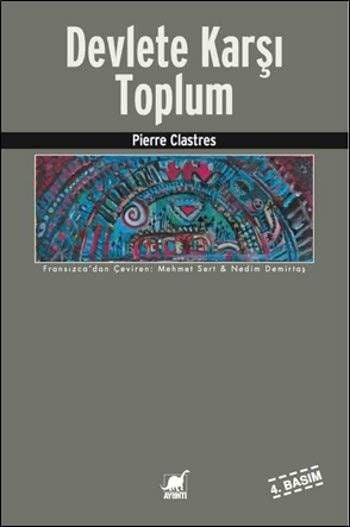
Devlete Karşı Toplum
Describing the lifestyle of hundreds of tribes, whose population varies between forty and a few thousand people, by using every square meter of the South American continent and living in full harmony with the ecological environment, as primitive, and considering the life of the Westerners, who rapidly destroyed the continent they captured through invasion and massacre, as civilized, has long lost its credibility. Thanks to the French anthropologist Pierre Clastres, we have now learned that the distinction between primitive society and civilized society should be read as the distinction between stateless society and state society. Today, if we can reveal the deep incompatibility between stateless society and state society in every aspect and draw some conclusions in favor of society against the state, we owe this to Clastres' bold attempt to blend anthropology and political philosophy with great mastery. Unaware of the state, despotism and church; primitive society living in harmony with the environment and in abundance according to its needs; How could it resist and survive the destructive, intolerant and domineering mentality of state societies that worship the One and power until the 20th century? Where did the wisdom of a society come from that attaches great importance to the power of the "Word" and does not hesitate to follow its prophets and search for the Land Without Evil as soon as it smells power and inequality? How did this society manage to prevent inequality, the power of the despot and preserve its integrity? And at what unfortunate, inevitable point did primitive society transform into today's state society, which we call civilized? According to Clastres, the solution to the riddle of the origin of the state lies in the meaning attributed to the chaos-nature-power relationship. While primitive or anti-state society defines power as an analogue of nature, an uncontrollable, negative force that can drag society into chaos; Civilized or state society saw power as a positive force that could put an end to the chaos of nature and take it under control. While primitive society tried to render nature harmless by confining it within a mythical-religious framework; Civilized society turned nature into a slave through power and the state and eventually destroyed it. Civilized society, trying to escape from the chaos of nature, is now mired in the chaos of the civilization it created. In this case, we want to ask once again: Were the savages wiser or are we wiser?
(From the Promotional Bulletin)
Number of Pages: 208
Year of Printing: 2016
Language: Turkish
Publisher: Details Publications
First Printing Year: 2000
Number of Pages: 208
Language Turkish
| Publisher | : | Details Publications |
| Number of pages | : | 208 |
| Publication Year | : | 2016 |
| ISBN | : | 9789755396132 |
| Translator | : | Nedim Demirtaş, Mehmet Sert |
| The heart | : | Turkish |


